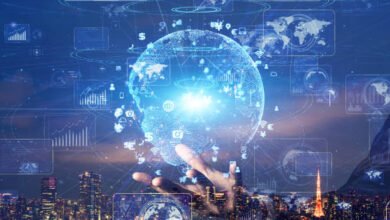How Artificial Intelligence is Beneficial in the Workplace? A Comprehensive Guide

Artificial Intelligence has revolutionized the world through its performance. However, it raises moral questions about work, privacy, and decision-making. Balancing innovation with responsibility is crucial for maximizing AI’s potential. AI improves productivity and drives innovation in the digital world. Employees can concentrate on more important work with the help of Artificial Intelligence, which automates repetitive processes. AI helps provide data-driven insights. AI-powered tools offer immediate support and personalized recommendations. It improves customer satisfaction, as Siri and Alexa answer the questions of many people instantly, whatever you ask them.
AI technology is like a computer’s brain, enabling it to think, learn, and make decisions like humans. But artificial Intelligence is just a lot faster and more efficient than humans. How does AI work? AI systems use sophisticated algorithms to analyze large amounts of data quickly.AI’s quick action improves decision-making abilities, productivity, and efficiency. It can save time by automating repetitive tasks. This allows employees to focus on more strategic and creative ideas to improve things. AI is vital in innovations, data saving, security, and healthcare.
What is Artificial Intelligence?
AI is a collection of technologies that enables computers to perform various tasks that require human Intelligence. Natural language processing is an essential aspect of Artificial Intelligence. It enables computers to comprehend and interpret human language similarly to humans. AI has brought about much more profound shifts in human interaction and communication. It is revolutionizing lifestyles and professional work.
How does AI work?
AI uses math computer code to make it work, but it still needs humans to tell it what to do and how to do it right. AI can help us with lots of things, such as diagnosing diseases, customer service, and even driving cars. One critical part of AI is machine learning, which allows machines to learn from experience. As machines learn, they can adapt to new situations and even generate new insights from this data. AI works like magic; if you ask anything, it responds, and no one knows how it works.
How does AI Work? Artificial Intelligence is not very intelligent because it needs a lot of data to answer. So, these AI Engineers downloaded the entire English internet Content and saved it in one big text file. They turned the entire text internet into numbers because machines only understand numbers.
The Technology Innovation Institute copied the brain’s basic structure and put it inside a computer. This brain is actually dumb and needs to be trained. AI Engineers train these brains billions of times, tweaking them again and again until this dumb brain becomes really smart after billions of Trials.
How Artificial Intelligence is Beneficial In The Workplace?
1. Automation of Repetitive Tasks
The artificial intelligence revolution can automate all the time-consuming jobs. It has been experiencing some changes in the job market due to AI. It reduces human error and speeds up work efficiency. It results in cost savings and more efficient and consistent results. It will help automate repetitive or arduous tasks, freeing you up to focus on higher value-added work. It leads to higher productivity and increased efficiency and provides job satisfaction.
It allows employees to easily focus on creative ideas. As a result, they focus on strategic planning, innovation, growth, and development, which results in a more satisfied workforce.
2. Improved Healthcare:
AI is helpful for disease diagnosis, image analysis, and patient outcome prediction. When artificial Intelligence is used to interpret X-rays or CT scans, medical personnel can spend more time conversing with patients and collaborating with other healthcare providers instead of squinting at images. This results in better patient care, individualized treatment programs, and more accurate diagnostic results.
3. Enhanced Decision-Making
Beyond speed, artificial Intelligence (AI) can analyze data with accuracy and complexity that may require more work. Extensive data sets from various sources, including past data, actual time inputs, and analytical models, can be analyzed by AI systems to produce comprehensive and valuable insights. This enables companies to predict market trends, maximize pricing plans, and target specific audiences with marketing campaigns. AI may also predict possible results and simulate multiple scenarios, which enables leaders to make more assured judgments in unpredictable situations. Making decisions at this level of knowledge is essential to remaining competitive in industries.
4.Increased Innovation
AI promotes innovation rather than merely freeing up time for it. AI can find possibilities and gaps for new products or services by evaluating data from various sources, including rival activity, market trends, and customer feedback. Moreover, AI can expedite the simulation and testing of concepts in research and development, reducing the time and expense of introducing novel products to the market. In addition to encouraging innovation in operational procedures, AI may help companies consistently increase productivity, reduce waste, and improve the calibre of their output. This ability to continuously innovate is crucial for companies hoping to stay ahead of the competition and adjust to shifting market conditions.
5.Improved Customer Service
AI can anticipate a customer’s wants and tailor recommendations based on past encounters and personal preferences beyond simple query answering in customer service. Businesses may provide individualized solutions and proactive support using AI-powered systems to analyze client data and uncover behavioural patterns. An AI-powered chatbot, for instance, can identify when a user is having problems with a product and provide an instructional or troubleshooting guide before the user contacts support. AI may also help human customer care agents by giving them access to real-time data and recommended actions, which enables them to handle problems more quickly and effectively. This degree of attentive, customized service improves client satisfaction and fosters more solid, enduring bonds.
6.Strengthened Cybersecurity
Artificial Intelligence plays a more significant role in cybersecurity due to increasing cyber-attacks.
AI can continuously monitor the behaviour and network traffic with the help of machine learning. AI can identify abnormalities, for instance, when a worker accesses private information from a strange place or at an odd hour. Artificial Intelligence (AI) helps firms to minimize potential damage by quickly spotting these dangers in real-time. Because AI analyzes cybercrime trends and updates security measures accordingly, it also plays a critical role in anticipating and preventing cyberattacks. AI can automate regular security chores like vulnerability assessments and patch management. So systems stay safe without requiring continual human supervision.
Wrapping Up
Artificial Intelligence is a powerful tool that can boost cybersecurity and automate tedious tasks. Its potential to revolutionize our workplace further shows its capacity to foster innovation and improve customer service. The task now shifts to handling the moral complexities of this change and making sure.
AI enhances rather than replaces human talents. It is essential to approach the integration of AI with a look toward supporting collaboration between AI systems and people, striking a balance between efficiency and human-centred values, and preparing the workforce for the inevitable transitions that AI will bring about. The ability of businesses to effectively utilize AI’s advantages while resolving its drawbacks will ultimately determine how successfully the technology is applied in the workplace. Businesses may foster an environment where human and artificial Intelligence collaborate to achieve better success and innovation by doing this.
Frequently Asked Questions
Will Artificial Intelligence replace humans in the workplace?
Artificial Intelligence can handle jobs that boost productivity and allow workers to be more creative, inventive, and action-oriented. Due to artificial Intelligence, the employment economy will change. Some professions will become obsolete as computer programs take their place. Still, new ones will also need to be established since they will alter the fundamental nature of the services that businesses offer and require their design and supervision.
How does AI increase worker productivity?
AI systems can do time-consuming jobs like data entry and customer support inquiries, freeing up staff members to focus on higher-value jobs that call for human judgment and creativity.
Will AI take over human jobs in the workplace?
Even though AI can automate some processes, employment will probably change rather than be entirely replaced by AI. AI may create new employment positions in data analysis, strategic planning, and AI system management.
Is AI secure in the workplace?
AI systems may be kept safe if they are developed and kept up to date with robust cybersecurity safeguards. However, organizations must watch out for any security holes and ensure AI tools abide by data protection laws.




